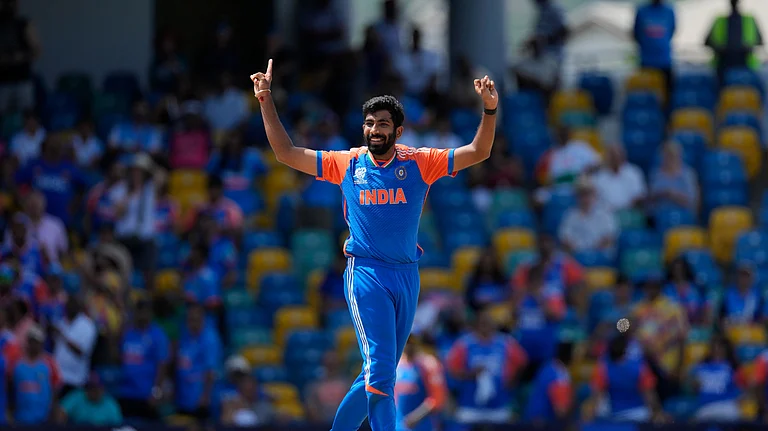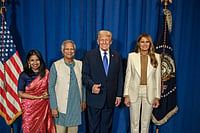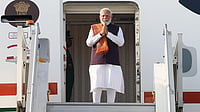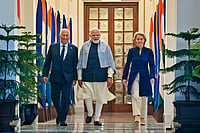Frankly admitting uncertainty on the future of India-China relations, foreign minister S. Jaishankar laid down publicly for the first time the eight parameters for stabilising ties between the two Asian giants.
The minister has spoken in bits and pieces on all these aspects but never laid down so vividly the eight propositions as well as three “mutuals” to get relations back on track. Even as he laid down the path for pulling back relations from the brink, the two armies continue to face each other in the freezing temperatures across eastern Ladakh. After nine rounds of military-commander talks and innumerable diplomatic exchanges, the situation along the India-China border remains tense.
The minister was delivering the keynote address at the All India Conference of China Studies, organised by the Delhi-based Institute of Chinese Studies on Thursday. Admitting that the “events of 2020 have put our relationship under exception stress”, Jaishankar said that ties between the two Asian neighbours “… is today truly at a crossroads. Choices that are made will have profound repercussions, not just for the two nations but for the entire world”. He said it was important to stabilize relations even as the two countries adjusted to changes. He went on to enumerate the eight propositions needed to restore stability in the region:
1) The importance of adhering to agreements already reached, both in letter and spirit. India has been emphasising this right from the start. During his virtual meeting with state councillor and foreign minister Wang Yi, in May, the Indian minister had repeatedly stressed this point.
2) The LAC must be observed and respected. Across the India-China border, the LAC cannot be changed unilaterally. He said that any attempt at unilaterally changing the status quo was “unacceptable”
3) Peace and tranquillity in the border areas is the basis for the development of relations in all other aspects. After what happened in May last year, it cannot be business as usual. Delhi made this abundantly clear by banning 53 Chinese apps, including the hugely popular TikTok. Chinese companies will get little traction now in India.
4) Multi-polar Asia: Jaishankar also made it clear that while India and China are on the same page on working for a multi-polar world, the same applied to Asia. “…there should be a recognition that a multi-polar Asia is one of its essential constituents”, the minister said.
5) Sensitivity to each other’s concerns: While conceding that India and China will obviously have different interests, concerns and priorities, sensitivity to them cannot be one-sided. Reciprocity is essential in international relations...
6) Rising Powers with Different Aspirations: The minister acknowledged that both rising Asian powers will have their own set of aspirations and their pursuit too cannot be ignored.
7) Differences between nations are a reality: There will always be divergences and differences but their management is essential to our ties.
8) Long-term view of ties: Civilisational states like India and China must always take the long view of their relations and not be stuck by the here and now.
The importance of adhering to agreements already reached, both in letter and spirit. India has been emphasising this right from the start. During his virtual meeting with state councillor and foreign minister Wang Yi, in May, the Indian minister had repeatedly stressed this point.
The LAC must be observed and respected. Across the India-China border, the LAC cannot be changed unilaterally. He said that any attempt at unilaterally changing the status quo was “unacceptable”
Peace and tranquillity in the border areas is the basis for the development of relations in all other aspects. After what happened in May last year, it cannot be business as usual. Delhi made this abundantly clear by banning 53 Chinese apps, including the hugely popular TikTok. Chinese companies will get little traction now in India.
Multi-polar Asia: Jaishankar also made it clear that while India and China are on the same page on working for a multi-polar world, the same applied to Asia. “…there should be a recognition that a multi-polar Asia is one of its essential constituents”, the minister said.
Sensitivity to each other’s concerns: While conceding that India and China will obviously have different interests, concerns and priorities, sensitivity to them cannot be one-sided. Reciprocity is essential in international relations...
Rising Powers with Different Aspirations: The minister acknowledged that both rising Asian powers will have their own set of aspirations and their pursuit too cannot be ignored.
Differences between nations are a reality: There will always be divergences and differences but their management is essential to our ties.
Long-term view of ties: Civilisational states like India and China must always take the long view of their relations and not be stuck by the here and now.
Jaishankar has put out the broad matrix within which a solution to the current crisis can be found. In addition, he also laid down three mutuals: mutual respect, mutual sensitivity, and mutual interests. In conversations with the Chinese all these various points must have been raised by the Indian side, what are China’s views on these propositions are not known. But the minister has laid India’s cards for rapprochement on the table.



























